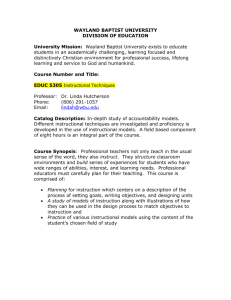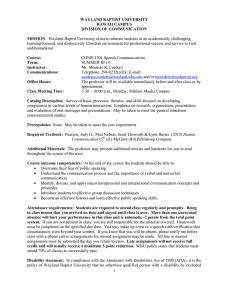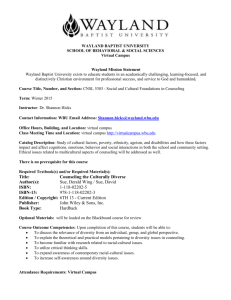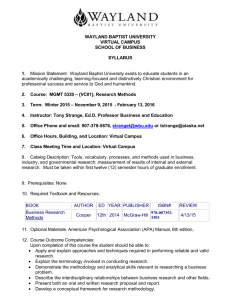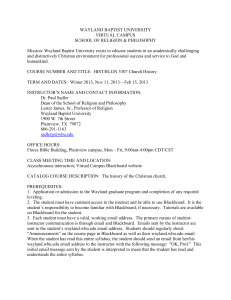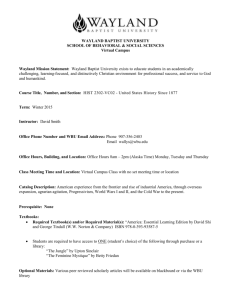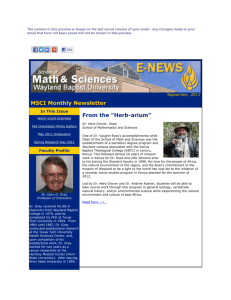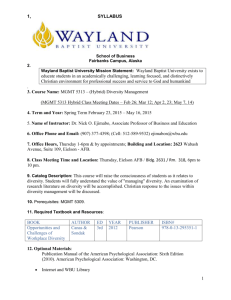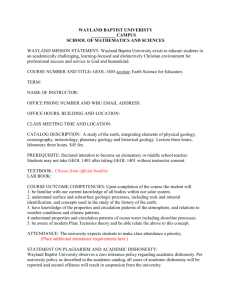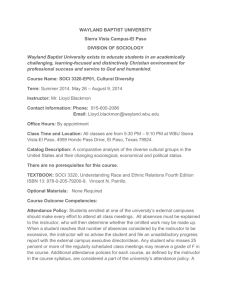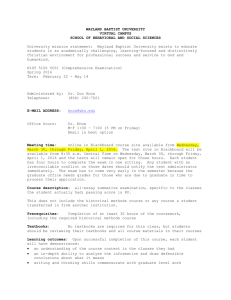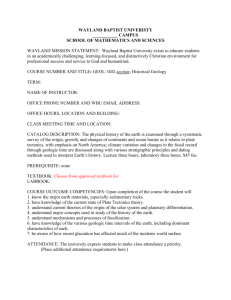EDUC 5305 - Wayland Baptist University
advertisement
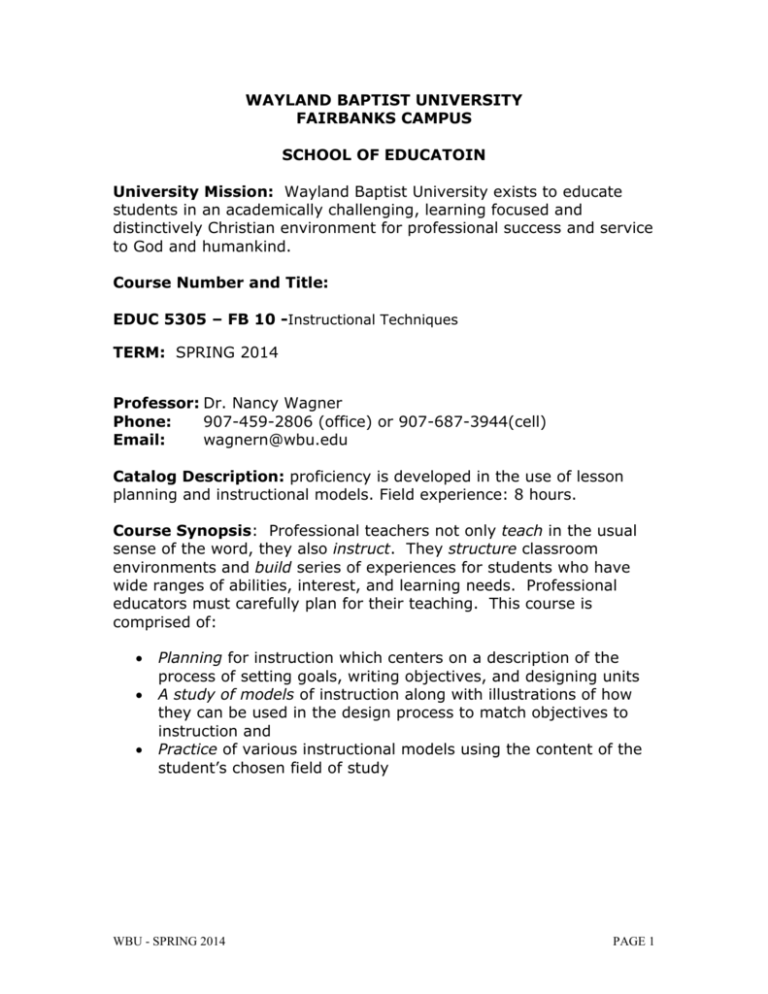
WAYLAND BAPTIST UNIVERSITY FAIRBANKS CAMPUS SCHOOL OF EDUCATOIN University Mission: Wayland Baptist University exists to educate students in an academically challenging, learning focused and distinctively Christian environment for professional success and service to God and humankind. Course Number and Title: EDUC 5305 – FB 10 -Instructional Techniques TERM: SPRING 2014 Professor: Dr. Nancy Wagner Phone: 907-459-2806 (office) or 907-687-3944(cell) Email: wagnern@wbu.edu Catalog Description: proficiency is developed in the use of lesson planning and instructional models. Field experience: 8 hours. Course Synopsis: Professional teachers not only teach in the usual sense of the word, they also instruct. They structure classroom environments and build series of experiences for students who have wide ranges of abilities, interest, and learning needs. Professional educators must carefully plan for their teaching. This course is comprised of: Planning for instruction which centers on a description of the process of setting goals, writing objectives, and designing units A study of models of instruction along with illustrations of how they can be used in the design process to match objectives to instruction and Practice of various instructional models using the content of the student’s chosen field of study WBU - SPRING 2014 PAGE 1 Textbooks: BOOK AUTHOR ED YEAR Instruction: Gunter, A Models Estes & 6th Approach Mintz A Whole Pink, Daniel New Mind Prerequisite Courses: None PUBLISHER ISBN# REVIEW Allyn & Bacon Pearson 9780137046737 Sept. 2011 Berkley 9781594481710 Sept. 2011 Course Outline and Tentative Schedule: Module Topic Chap /Week One Educational Standards 1 Face-to-Face Two Organizing Content and Instructional 2-3 Virtual Class Objectives, Assessment and Meeting Instruction Three Face-to-Face The Direct Instruction Model 4 Due Date Feb. 26 March 5 March 12 Spring Break – March 17-21 Four Five Six Face-to-Face Seven Eight Face-to-Face Nine Ten Face-to-Face Eleven Face-to-Face Concept Attainment and Concept 5-6 Development Models Problem-Centered Inquiry and The 7-8 Synectics Model Cause-and-Effect Model 9 Assigned Topic Presentations The Vocabulary Acquisition Model 11and The Integrative Model 12 Socratic Model 10 Assigned Topic Presentations Cooperative Learning Models and The 13 & Wisdom of Practice 17 Field Experience Essays Due Case Study Student Presentations 14Auto-ethnography Due 15 Case Study Student Presentations 14(continued) 15 WBU – SPRING 2014 March 26 April 2 April 9 April 16 April 23 April 30 May 7 May 14 2 Course Requirements: The student will develop lesson planning skills through conceptual research and writing activities. Each module will require conceptualizing the ideas presented in the textbook through weekly assignments, presentations and a field experience. Reading Assignments – Reading assignments must be completed prior to the class session for which they are scheduled for discussion. Reaction Journals – Written reactions to readings, classroom discussion and activities will be submitted from week one – week nine. Assigned Topic Presentation – A topic from the book, A Whole New Mind, will be assigned to each student for in-depth study. A synopsis of the topic will be presented in class using instructional strategies taught in the course. Case Study Presentation – Examine a case study presented in the textbook, prepare to present your findings in class through activities and reflective questions. Auto-ethnography – The auto-ethnography is a culmination of all experiences in the course. Students will write narrative of their journey toward understanding. Field Experience – Eight hours of field experience are required for this course. Details of this experience will be discussed in class. A brief essay summarizing your experience will be required. Computation of final grade: 1. Reaction Journals (100 points) 2. Assigned Topic Presentation (100 points) 3. Case Study Presentations (100 points) 4. Auto-ethnography = (100 points) 5. Field Experience/Essay = (100 points) Total points= 500 points A=500-450 points B=449-400 points C=399-350 points D=349-300 points F=299 or below- FB10 WBU – SPRING 2014 3 Attendance Requirements: Attendance is required. “Students enrolled at one of the university’s external campuses should make every effort to attend all class meetings. All absences must be explained to the instructor who will then determine whether the omitted work may be made up…any student who misses 25 percent or more of the regularly scheduled class meetings will receive a grade of F in the course. Additional attendance policies for each course, as defined by the instructor in the course syllabus, are considered a part of the university’s attendance policy” (Wayland Baptist University 2012-2013 Catalog, p.91). Class time missed due to excessive late arrivals or early departures will be recorded. If the accumulated time reaches as much as three hours, it may be recorded as an absence. Six hours of accumulated time from late arrivals or early departures may be recorded as two absences. Students with excused absences will be allowed to make up work missed due to the absence and participation points will not be deducted. Disability Statement: “In compliance with the Americans with Disabilities Act of 1990 (ADA), it is the policy of Wayland Baptist University that no otherwise qualified person with a disability be excluded from participation in, be denied the benefits of, or be subject to discrimination under any educational program or activity in the university. The Coordinator of Counseling Services serves as the coordinator of students with a disability and should be contacted concerning accommodation requests at (806) 291- 3765. Documentation of a disability must accompany any request for accommodations.” Plagiarism Policy – Intellectual integrity and truthfulness are fundamental to scholarship. Scholars, whether they are performing as students or as teachers, are engaged in a search for truth. Plagiarism is a form of cheating and also a form of theft. Plagiarism occurs when a student fails to give proper credit when information is either quoted or paraphrased. Carelessness is no excuse. As such, it is a breach of scholarly responsibility. It is also unethical and in some cases, illegal. Looking at or copying someone else’s test, answer sheet, and/or paper are counted as cheating. Plagiarism will result in an “F” in the course. Classroom Teaching and Learning: As a teacher, it is my responsibility to facilitate the learning process in a way that develops an excitement about learning. I teach because I love learning. I want to pass my passion and love for learning on to my students. I want to motivate them and inspire them to believe in themselves. WBU – SPRING 2014 4 Knowing that my students leave my class feeling good about themselves and the knowledge and skills they have acquired is very rewarding. Learning should be enjoyable and motivating. I believe my responsibility, as a teacher, is to create a classroom environment conducive to learning: a place where students are actively engaged. We will use a variety of learning strategies (small group and large group discussions and debates, carousel brainstorming, role play, student presentations, jig-saw activities, think-pair-share activities, collaborative projects, etc.). While lecture is necessary, it will not be the main mode of instruction. My instructional strategies will vary to meet the diverse needs of my students. Using a mixture of working in pairs, small groups, and large group provides a safe and comfortable environment for discussions around course content. I believe in doing whatever it takes to ensure that learning occurs. I incorporate as many experiential learning opportunities as possible. Applying course content and critical thinking skills to solve current problems provides the relevance needed to keep students interested and engaged. I have high expectations for my students. I expect them to apply themselves and to engage in classroom activities. I expect them to think critically and be effective consumers of information from a variety of sources, including Web-based resources. I expect them to master the content of the course and to apply it to real-world situations. My job is to facilitate a variety of interactive learning experiences that will support my students in reaching these expectations. Student Responsibilities: Students are responsible for reading, understanding, and obeying all academic policies appearing in the Wayland Baptist University Academic Catalog applicable to their curriculum and/or program of study. Students are expected to be fully present and engaged in the classroom learning experiences being provided. Changes in Syllabus: Although this course is expected to follow the syllabus as written, the instructor reserves the right to adjust the syllabus. The instructor will inform the students of all major changes in a reasonable and timely manner. WBU – SPRING 2014 5
